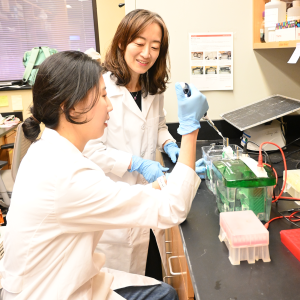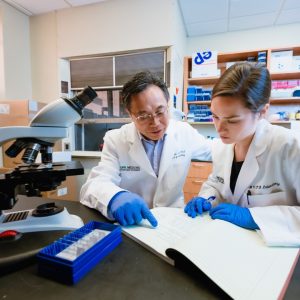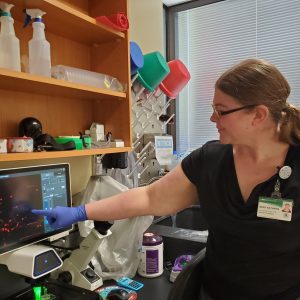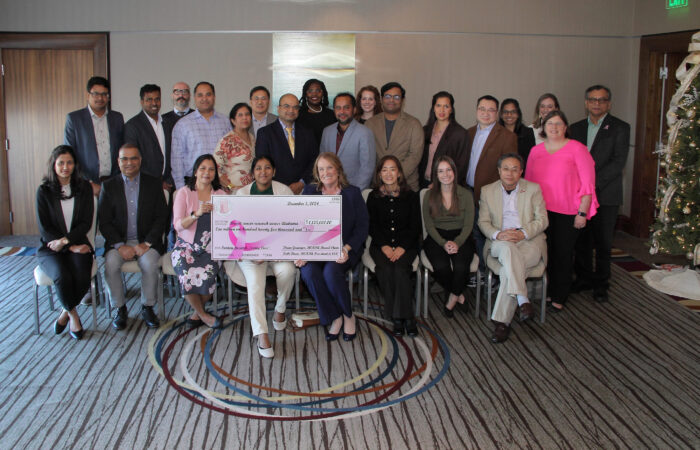The Breast Cancer Research Foundation of Alabama (BCRFA) is proud to announce the funding approval…
BCRFA Fuels UAB Breast Cancer Research With Recent Grants
The BCRFA is pleased to announce funding for three pre-RO1 breast cancer projects at the O’Neal Comprehensive Cancer Center at UAB. Grantees will receive $160,000 over two years. The grants were peer-reviewed by a panel of UAB faculty.
Researchers and projects receiving funding include:
Erin Ahn, Ph.D. – “Phenotypic and Metabolic Reprogramming of Breast Cancer by MascRNA”
Dr. Ahn’s research aims to understand the role of a small RNA molecule, mascRNA, in breast cancer cells. This molecule appears to promote faster cancer cell growth while inhibiting their ability to spread. Her previous findings suggest a potential to enhance chemotherapy, particularly for triple-negative breast cancer (TNBC), by restraining TNBC cells and making them more responsive to treatment. Dr. Ahn’s findings could lead to a more effective and targeted approach to treating aggressive breast cancers like TNBC.

Bin Ren, M.D., Ph.D. – “Targeting the Signaling that Drives Arteriolar Niche Formation and Cancer Cell Stemness”
Dr. Ren’s project investigates how the growth of small blood vessels (arterioles) in tumors contributes to the spread of cancer cells to other organs. Knowing that blood vessels create an environment supporting the formation of aggressive cancer cells with metastatic potential, the researchers aim to develop and test strategies that target the signaling processes in these blood vessels to control the spread of malignant cells. Dr. Ren’s work has the potential for identifying new treatments that specifically address the metastasis of cancer, offering improved outcomes for patients.

Mary Kathryn Sewell-Loftin, Ph.D. – “The Role of Biomechanical Regulation in Triple Negative Breast Cancer”
Triple negative breast cancer is aggressive with a low survival rate after the disease spreads. Dr. Sewell-Loftin’s work will focus on how mechanical forces drive cancer cell growth, movement, and response to drugs. Results will help develop novel treatment strategies to block mechanical regulation of tumor growth.

Pre-R01 grants support researchers in the early stages of their work. Pre-R01 grants help researchers gather preliminary data, demonstrate the feasibility of their ideas, and develop the necessary groundwork for a more extensive research proposal. The funding serves as a launching pad for new research, enabling scientists to refine their research questions and facilitate a successful R01 grant from funders like the National Institutes of Health (NIH).
In addition to supporting breast cancer research projects through OCCC’s O’Neal Invests grant cycle, the BCRFA considers grant requests from other Alabama-based research institutes through its annual grant cycle. Eligibility details and submission requirements will be included in the BCRFA’s 2024 Request for Proposals released in August.
In 2023, the BCRFA invested $1.25 million in 35 cutting-edge research projects at eight esteemed institutions across the state, including Alabama State University, CerFlux, Inc., HudsonAlpha Institute for Biotechnology, Tuskegee University, O’Neal Comprehensive Cancer Center at the University of Alabama at Birmingham (UAB), University of Alabama, and Mitchell Cancer Institute at the University of South Alabama.
About the Breast Cancer Research Foundation of Alabama
Founded in 1996, the Breast Cancer Research Foundation of Alabama (BCRFA) is a nonprofit organization whose mission is to help find a cure for breast cancer by funding promising breast cancer research in Alabama and raising community awareness and funding for that research. BCRFA funds promote a comprehensive approach to battling breast cancer by promoting collaborative and innovative research to help diagnose, treat, prevent, and eradicate the disease.
With community support, the BCRFA has invested over $15 million in life-saving breast cancer research and treatments across Alabama since its founding in 1996. Most recently, in December 2023, the foundation announced its annual grant investment of $1.25 million to research partners including the O’Neal Comprehensive Cancer Center at the University of Alabama at Birmingham (UAB), Alabama State University (Montgomery), Auburn University, CerFlux, Inc. (Birmingham), HudsonAlpha Institute for Biotechnology (Huntsville), Tuskegee University, the University of Alabama (Tuscaloosa), and the Mitchell Cancer Institute at the University of South Alabama (Mobile). All funding stays in Alabama, but the impact is worldwide.



